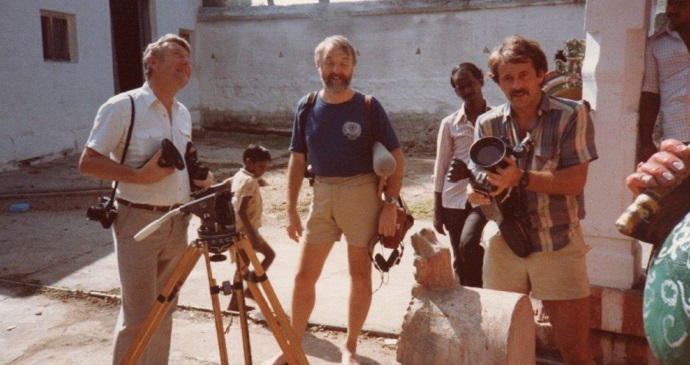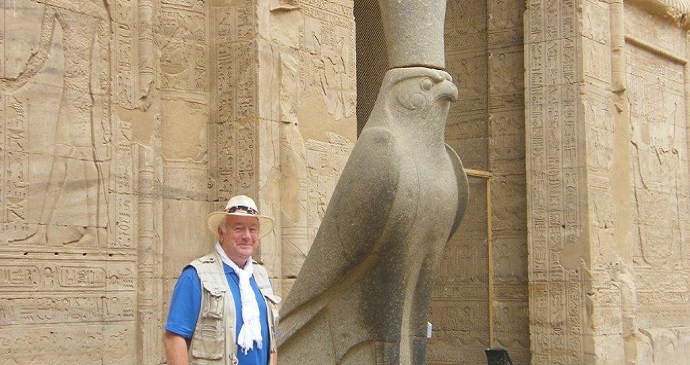We chat to John Carter, author of Gullible’s Travels and presenter of BBC’s Holiday and ITV’s Wish You Were Here, about the reality of travel broadcasting and his love for cruise ships.
1. How did you end up moving from journalism into broadcasting?
The move from print journalism into television (and, later, radio) came when I found myself sitting next to a BBC executive at a formal dinner – he was our speaker that evening and I was secretary of the group which had invited him. I took the opportunity to mention holiday travel and how it would be the perfect subject for a “consumerist” television series. At the time (the mid-1960s) travel on television consisted of exploration and wildlife films in black and white. It took several years of lobbying and arguing, but finally the BBC Board of Governors, no less, gave the go ahead for a series that would mention brand names and prices. This was a massive breakthrough for the BBC, and a brave decision, as the format was perilously close to advertising – anathema to the Corporation. The series “Holiday” was to run for nearly 40 years.

John Carter with Chris Sadler and Robin Swain, © John Carter
2. On the television it looks like a lot of fun, but I’m sure there’s much more that goes into it behind the scenes?
Everything on television (yes, even the news) cannot escape an element of show business. As a journalist, I found this immensely frustrating, but learned to live with it. The best example of reality being nothing like the finished product was a series of items we did about travelling leisurely through France, using little known routes and discovering delightful small towns, hotels and restaurants off the beaten track. In fact the programme was filmed at a very fast pace, with high speed motorway journeys between the locations. And, of course, the following year those undiscovered spots had been well and truly discovered by many thousands of our viewers.
3. The travel trade sells a dream that doesn’t always conform with resort – which place on your travels has come closest to the dream and which the furthest?
The city that lived up to my expectations is Venice. The country, Australia.
As for the places that disappointed, I have to say that the Seychelles were originally oversold by the travel industry as an alternative to the Caribbean, which they were, and are, not. And I was also disappointed in the Maldives, though I know many people who rave about them.
4. Tourists now are often looking for authentic experiences – what is the least authentic celebration (or local speciality) you have come across?
The least authentic holiday experiences are those which have no pretence of being authentic – the many theme parks one can visit in the USA and elsewhere. Watching a Wild West stunt show laid on by Disney is a lot of fun, especially when you watch it with your children. But nobody believes the real West was anything like that.
The same goes for those all-inclusive resorts, originally designed to meet the needs of elderly travellers from middle America who were terrified of “abroad”. They are no more than air-conditioned ghettoes which bear no true relationship to the places in which they are located.
5. Many of your tales are set on cruises – what is it about the nature of cruises that makes them such fertile ground for good stories? What was your funniest cruise experience?
Cruise ships – real cruise ships – are like floating villages and, like villages, have their share of true-life stories. Small adventures, intense romances, heightened feelings. As a writer, all I have to do is sit and observe what is going on around me. I have combined real incidents with a touch of fiction to produce some of the tales in “Gullible’s Travels”, because real life doesn’t always provide a neat ending. Incidentally, I said “real cruise ships” because I don’t regard huge superliners as cruise ships at all. They are massive floating hotels with no nautical character and, again, are the result of the American influence on modern travel.
6. Gullible’s Travels is such an interesting read! What made you decide to compile all your adventures into a book?
I wrote the stories down at the instigation of a lady named Carole Howkins, who had heard me tell some of them during, and after, dinners, and said it would be a shame if they weren’t put on record. During my years on television I was in demand as an after-dinner speaker – and still am, from time to time – and was often asked if I intended to write a book. I always said yes, but Carole was the person who persuaded me to fulfil my promise.
7. If you could time travel to one spot again where would you choose and when?
If I could travel back in time, it would be to the earliest years of travelling for pleasure, long before the Grand Tour or the appearance of Thomas Cook. I would love to learn exactly how the Greeks and Romans organised their holiday excursions, or what Medieval pilgrims really thought about the holy places and relics they visited. Having said that, though, I would like to find out for sure if Jules Verne ever met Thomas Cook, for “Around the World in Eighty Days” was inspired by Cook’s 1872 Global Excursion. Sit those two opposite each other and the conversation would be enthralling. Or, possibly not, as Thomas Cook was a dour teetotaller and may not have appreciated the author’s company!

John Carter at Edfu Temple © John Carter
8. What are your future travel plans?
Right now I am about to go to Dubrovnik for a week. I know the city well, from the earliest days of my travels, but will be in the company of someone who has never been there, so will be interested to see the city through a different pair of eyes. I hope to spend Christmas in a delightful hotel in the Cotswolds (by permission of my children and grandchildren). As for 2017, there is the definite prospect of Colorado, and other trips which will be thought over during that Cotswold Christmas break.
Want to read more from John? Gullible’s Travels is available with a 10% discount here.
